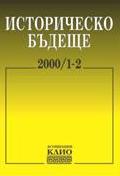Япония и икономическата интеграция в Азиатско-тихоокеанския регион
Japan and the Economic Integration in the Asia-Pacific Region
Author(s): Volya ArgirovaSubject(s): History
Published by: Асоциация Клио
Keywords: Japan; Asia-Pacific region (APR); regional economic integration; Asia-Pacific Economic Cooperation; APEC structure; decision-making
Summary/Abstract: Japan, being the second economic power in the world and the most developed Asian country, has contributed greatly in the regional economic cooperation in the Asia-Pacific region (APR). One of the major achievements of the Japanese foreign policy was the establishment of the Asia-Pacific Economic Cooperation (APEC) forum in 1989 and its development from that moment on. Presently, APEC includes 21 member-economies. The article focuses on two ranges of issues. First, it examines the origins of the Japanese idea of the economic cooperation in APR and its evolution into a strategy. Japan has long-standing interests in the region. However, the opportunity for Tokyo to start the process towards regional integration became reality only when certain factors developed at an appropriate pace and time. Second, the article pays special attention to the still short but eventful APEC history. The ministers and leaders of the member-economies hold annual meetings and take measures aimed at strengthening and enlarging the scope of cooperation. They also take careful steps towards institutionalizing the loose and flexible APEC structure. Japan plays a great role in this process and contributes to promoting trade liberalization, investment facilitation, and science and technology cooperation. Finally, the concluding part of the article stresses the unique character of APEC as a new regional economic community, which embraces a spectrum of economies on various levels of development. It is not a rigid institution and consensus is the principle of decision-making. It is open and, hopefully, will continue to be a part of the world's globalization process.
Journal: Историческо бъдеще
- Issue Year: 2000
- Issue No: 1-2
- Page Range: 56-77
- Page Count: 22
- Language: Bulgarian
- Content File-PDF

